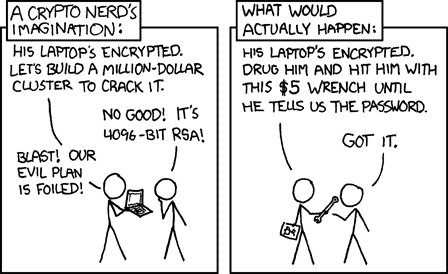Welcome fren! Bitcoin privacy is always a huge struggle for beginners.
This isn’t surprising given how utterly terrible most mainstream media pieces are on the topic, if they even mention it at all! You might have heard about how Bitcoin is “anonymous”, but that’s complete bullshit.
In fact, if it’s used incorrectly (like what most people do) it can actually expose your private details like name, address, transaction data etc to anyone on the entire internet, putting you at real risk of physical harm.
That’s why we’re providing a full series of privacy guides for everyone starting with this beginners guide to Bitcoin privacy. If you’re in the Advanced or Expert levels already then you’ll know most of this. But. If you’re new here then you must read this article before doing anything related to Bitcoin (it’ll save you a crap ton of grief in the future).
First let’s dig a bit deeper into the main question on your mind.
Note: This Privacy guide is for “Beginner Levels” which are people with either no bitcoin funds or “Pocket Money” level funds. If you’re securing larger amounts, please see our Advanced Bitcoin Privacy and Expert Bitcoin Privacy level guides
Contents
Are Cryptocurrency Transactions Anonymous?
No. Bitcoin is pseudo-anonymous. This is because while Bitcoin transactions don’t use names or accounts like what your bank does, it is still possible to link transactions and addresses to real world identities.
To start with, anyone, anywhere can download a Bitcoin Wallet like Sparrow for free and generate their own Bitcoin Address such as:
bc1qelem0ann687r2e9jax542lja7q8cu8s35h96pc
Now while this is technically “anonymous”, there are many ways your real world identity can be linked to that address. Forever. Whether it’s via your IP Address or you willingly telling an online exchange that “I’m John Smith” when you create your account and buy your coins, it’s something that’s becoming more and more common these days due to KYC requirements.
That’s why when it comes to Bitcoin, it’s especially important to know and practice good privacy. While other cryptocurrencies have been created to be “more private than Bitcoin”, they don’t have the decentralization, network security or network size that Bitcoin does and so aren’t really a great solution either.
The Importance Of Privacy
Usually most people are interested in the anonymity of Bitcoin because they’d like to keep their transactions private. Privacy is recognized as a fundamental human right by a number of international bodies like the United Nations. However many people in general still cling to the ridiculous “if you’ve got nothing to hide, then you shouldn’t mind them looking” notion.
This is clearly a nonsense argument. For example, you might walk around your house naked and if so more power to you, but we’re pretty sure you don’t want people staring in at you from the street so you close your blinds. You don’t have anything to hide and obviously aren’t doing anything illegal, but most of us like to keep our private parts well… private!

This right to privacy is extremely basic, is critical to a free society and extends to your finances as well. Most would also agree that random strangers shouldn’t get to know all the things you spend your money on. But with the current fiat banking world, they do. This is where, when used properly, Bitcoin can help.
Bitcoin Privacy vs The Internet
When it comes to privacy on the Internet you can sometimes afford to make a mistake. This is because you can have articles updated or removed if they’re inaccurate or wrong. You can delete that really bad Tweet before everyone sees it or request Google to take down some search results if you want.
GDPR in particular has been excellent at giving broad, powerful privacy rights to citizens when it comes to their data and removing or changing it. On top of these active things you can do, the Internet also slowly forgets content over time as well. Even though many like to claim “the Internet never forgets” it absolutely does. A lot! That’s why there’s projects like the Internet Archive.
Bitcoin is different.
Once a transaction is enclosed in a block and confirmed by the network it is impossible to change or remove. For eternity, anyone and everyone will be able to look back on it. It will be replicated onto every Bitcoin Full Node all around the world.
It is hard to remove information from the internet
Gigi
It is impossible to remove information from Bitcoin’s public ledger
This is why privacy in Bitcoin is so critical, even more critical than your privacy on the broader internet. While there are some parts that aren’t so damaging, there are a few that are incredibly and eternally damaging to you and your precious stash. But don’t get too scared, while Bitcoin isn’t super private by default, it’s not hard to make it that way.
New to Athena Alpha? Start today!
Don’t Use KYC/AML Exchanges
KYC (Know Your Customer) and AML (Anti Money Laundering) are regulations that all crypto exchanges like Coinbase or Binance have to comply with. It’s why they require you to “verify your identity” before they let you do anything. They want to know you name, address, drivers license, photo and more. This is just the beginning though.
All the big Crypto Exchanges enforce KYC and once you give them your private information they then link whatever bitcoin you buy to that identity. Forever. This obviously breaks the natural pseudo-anonymous nature of Bitcoin and from there the exchange, the government, third parties and chain analysis firms…
- Track what you spend your money on
- Track what your balance is
- Track what taxes you should be paying
- Sell all this information to other companies without telling you
- You get the picture
It gets worse though because as we all know, companies get hacked and your data spills out for criminals and scammers to buy and use. Whether it’s due to poor security, companies accidentally publishing their own data, companies having their data stolen or companies having unprotected APIs, absolutely no company, no matter how big is immune.
So what do you think happens when exchanges collect highly specific, personal financial information on millions of users that basically says “John Smith has $1m in Bitcoin and lives here”? Yeah. They get hacked and now bad people know how much Bitcoin you own and where to go to beat you with a $5 wrench.

The exchange can also confiscate or block you from being able to access your crypto too. Don’t believe us? Just check out this super not at all helpful page from Gemini telling you all the ways they’ll stop your from accessing your funds! How convenient!
Given this severe, eternal and unnecessary invasion of your privacy combined with the certain reality that all your private information will be hacked eventually, you should only use the Best No KYC Crypto Exchanges to buy your bitcoins. While it has a little bit of a learning curve to begin with, it’s by far the best thing any Bitcoin beginner can do.
To make sure you get off to the best start, we also have step-by-step guides detailing exactly how you can buy your first non-KYC bitcoins from some of our top reviewed and rated exchanges:
- How To Install Bisq On Ubuntu
- How To Install Bisq On Windows
- How To Buy Bitcoin On Bisq
- How To Buy Bitcoins Using RoboSats
- How To Buy Bitcoin On Peach Bitcoin
You can also check out our huge Crypto Exchanges database that lists and rates all the most popular exchanges. It allows you to filter them on things such as privacy, security, country, payment methods and more.
Self-Custody Your Coins
Not your keys, not your coins.
Holding your own Private Keys is the next most important thing to do when it comes to Bitcoin privacy. Whoever holds your keys knows everything. Your balances, your transactions, the senders and receivers, everything. You have zero privacy.
It also allows them to sensor, kick ban you or even spend your funds. Many who have trusted third parties with their keys such as centralized crypto exchanges have lost all their bitcoin. People have even lost their fiat money (USD, Euro etc) by using Fiat Wallets too. Examples include: FTX, MtGox, Cryptsy or CoinEx. If you have funds on a centralized exchange. Get. Them. Off. Now. You’ve been warned!
>> Deep Dive: Crypto Exchange Bankruptcies
To take custody of your own private keys means you’ll need to download and install your own Bitcoin Wallet software. If you’re a Beginner, just focus on setting this up and ensuring you only buy from non-KYC sources as described above. Examples of good Bitcoin wallets include:
- Desktop: Sparrow Wallet
- Android: Nunchuk and BlueWallet
- iOS: BlueWallet
Also make sure you backup your seed phrase with a standard 3-2-1 backup strategy, it should be resistant to theft, loss due to forgetting and fire/water/degradation damages.
Don’t Reuse Addresses
Bitcoin Address reuse is basically an accident and shouldn’t ever be done. Doing so not only kills your privacy but the other persons too. Most modern wallets do this automatically for you now though so it’s not a big issues, but it’s just something to make sure you never do.
Each time you receive funds it should go into a brand new address. Once those funds are spent that address should never be used again. All the wallet software listed above never reuse addresses and there’s even a new Silent Payments proposal coming up that will further help this.
Don’t Use Public Block Explorers
Looking up addresses or transaction ids on a public block explorer – for example on mempool.space or similar – will link those Bitcoin Addresses with your IP Address which, in turn, can be linked to your real world identity. Full Bitcoin Nodes like Umbrel and myNode make it easy to run your own block explorer.
If you don’t have your own Full Bitcoin Node and have to use a public block explorer, make sure to mask your IP by connecting to them via Tor, or at least use a VPN. More broadly, you should avoid or minimize third parties as much as possible as they’re always huge privacy and security holes.
Bitcoin Surveillance And Chain Analysis
Finally you should be aware that surveillance of the open Bitcoin Blockchain is something that happens on a massive scale. Chain Analysis companies are a thing and work together with centralized exchanges and other data mining operators to gather the most complete picture they can in order to sell this data to anyone and everyone.
Chain analysis is the surveillance of the Bitcoin blockchain and application of various heuristics to try and give a best guess as to who likely owns what bitcoins. This is possible because the Bitcoin blockchain is open and free for anyone to view. You don’t need to know how this all works, you just need to know that these companies exist and work closely with governments.
For it to be useful, they have to be able to link the bitcoin trail to a real world identity though. This is mostly done via KYC/AML exchanges so by only using non-KYC exchanges to buy your bitcoins you side step this significant privacy violation.
The Athena Assessment
Bitcoin privacy is constantly changing with new Bitcoin protocols, wallet features and more all tied up with the individuals specific situation. Some are buying $20 worth of altcoins and so don’t care if their exchange “knows all their info”. Others have hundreds of thousands of dollars worth of bitcoins and absolutely should have at least Advanced level privacy and security (check out our Guide To Advanced Bitcoin Privacy).
This is just a beginners guide, so we haven’t covered other important things like Hardware Crypto Wallets, using your own Full Bitcoin Node, Tor, Coin Control, Bitcoin Mixers and more. Learning about Bitcoin is a journey and a big part of that is learning about how to increase your privacy and security.
Don’t feel like you need to implement all privacy measures right from the start. You’re a beginner, so focus on just the main two beginner tasks: buying from non-KYC sources and taking full custody of your private keys and coins.
Over time as you gain understanding you can move up to an Advanced level and then Expert. This is why we have our Bitcoin Levels! To help guide everyone no matter what their background.
| Level | Beginner | Advanced | Expert |
|---|---|---|---|
| Funds Amount | Pocket Money | Savings Account | Serious Investments |
| Exchange Type | Non-KYC | Non-KYC | Non-KYC |
| Wallet Type | Software (Hot) / Hardware (Cold) | Hardware (Cold) | Hardware (Cold) |
| Signature Type | Single Signature | Single Signature | Multisig |
| Key Custody | Self Custody | Self Custody | Self Custody |
| Key Backup | Laminated Paper | Laminated Paper | Metal Seed Plate |
| Key Locations | 1+ | 2+ | 2+ |
| Key Security | None | Fire Proof Safe | Multiple Methods |
| Own Full Node | No | Yes | Yes |
| Electrum Server | Public Electrum toggle_on | Private Electrum toggle_on | Private Electrum toggle_on |
| Tor | No | Yes | Yes |
Other Resources:
- Digital Privacy
- Hodl Privacy FAQ
- Bitcoin Only Privacy
- Bitcoin Privacy Wiki
- Bitcoin Privacy Guide
- Swan Bitcoin Privacy
- This Month in Bitcoin Privacy
- Bitcoin Wallet Privacy Threat Model
FAQ
Is Bitcoin Traceable?
As the Bitcoin blockchain is public and permanent, Bitcoin is indeed traceable. Due to the way addresses are represented by essentially random alphanumeric characters, users identities are obscured, but not necessarily hidden. If your real world identity is linked to a Bitcoin Address it’s possible to then trace those funds via chain analysis and other methods.
Is Cryptocurrency Traceable?
With over 20,000 different types of cryptocurrencies there’s a wide range of answers to this question. While some coins are purposefully designed to be as untraceable as possible, others are fully centralized tokens that you can only purchase by verifying your identity first.
Is Bitcoin More Traceable Than Cash?
When most people spend cash there is typically no record of it, however with Bitcoin every transaction is recorded on the Bitcoin blockchain forever and is open for all to see and inspect. As a result, Bitcoin is far more traceable than cash.
Can Bitcoin Transactions Be Traced?
As the Bitcoin blockchain is public and permanent, Bitcoin transactions are indeed traceable. All you have to do is enter the transaction id into any blockchain explorer website and you can see exactly where all the different outputs go. Finding out who owns those transaction outputs is a completely different matter though and why chain analysis companies exist. This matching up of addresses and identities can be done through KYC exchanges or other heuristics.
Does Bitcoin Have Privacy?
Privacy is being able to selectively reveal yourself. It’s freedom from unauthorized intrusion or observation. As the Bitcoin blockchain is completely open and transparent, anyone can “observe” your transactions. All transaction are pseudo-anonymous though and don’t contain names or real world identities. So while Bitcoin is open and allows anyone to view its transactions, it does have privacy as you are allowed to selectively reveal yourself (the act of proving you are the owner of certain bitcoins).
How Can I Increase My Bitcoin Privacy?
For beginners the two most important steps to increasing your Bitcoin privacy are to avoid using KYC/AML exchanges and to self-custody your coins. Once you have mastered that you should look into other important things like hardware wallets, using your own Full Bitcoin Node, Tor, Coin Control and CoinJoin.
Can You Own Bitcoin Without A Wallet?
No. Bitcoins need an address to be sent to which is generated by a Bitcoin Wallet. While most people assume keeping their bitcoins on an exchange means they don’t have a wallet, that is still a wallet. It’s just an online or “hot” wallet that you don’t have custody over just like a bank account.



